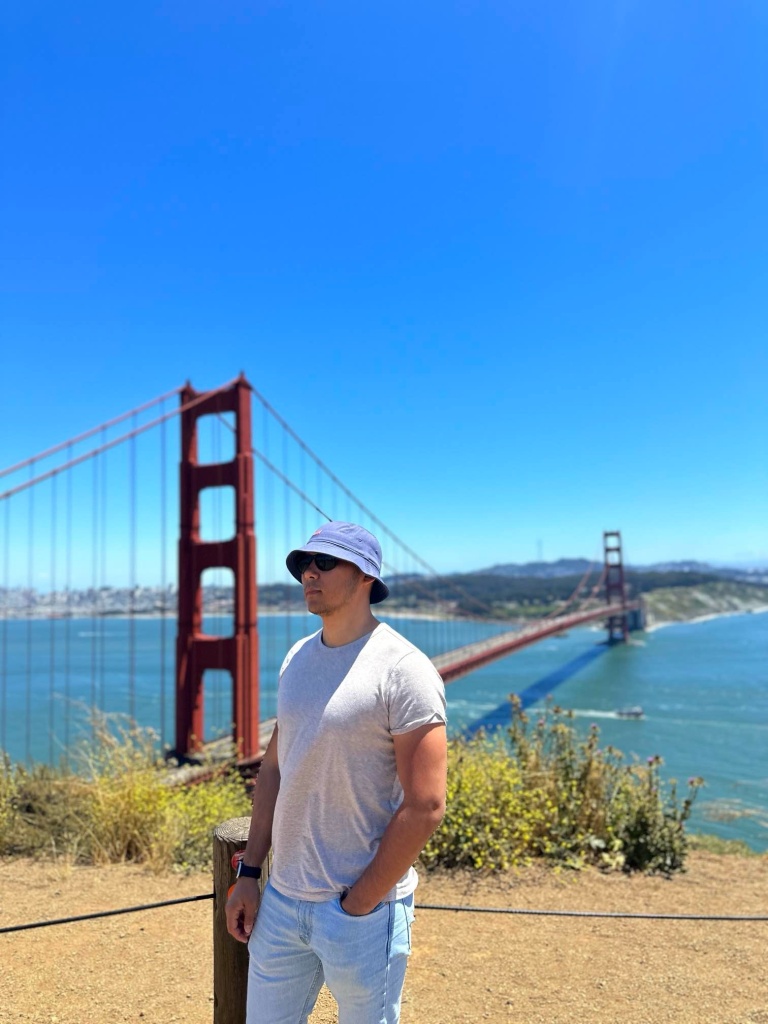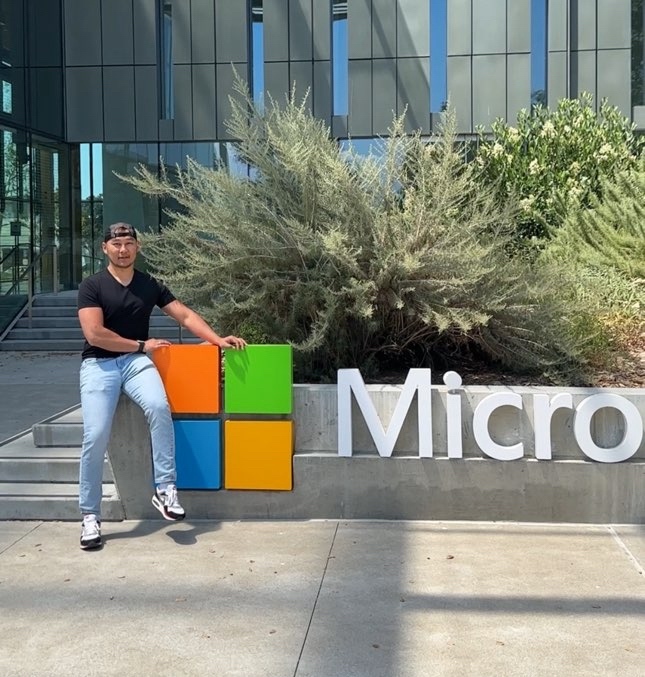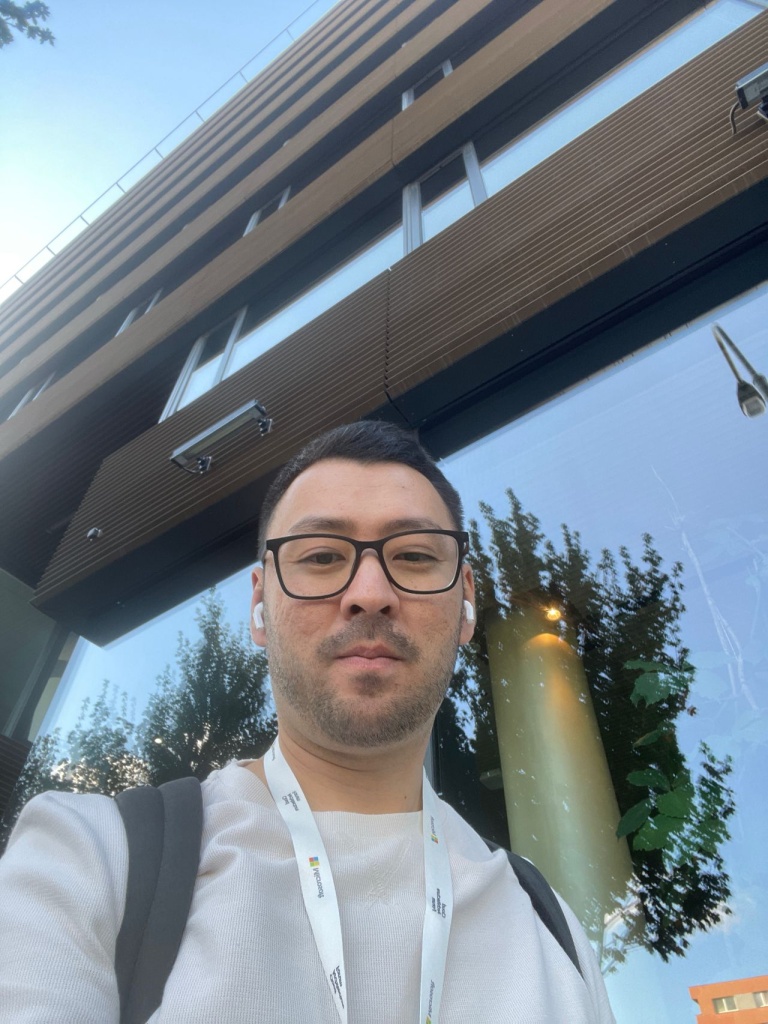We gathered insights from engineers working at Microsoft who shared how they built their careers, navigated the interview process, adapted to the company culture, and what advice they have for those aiming to join a global tech giant.
Nurgeldi Batyrbekov, based in Chicago — Software Engineer, linkedin

About me and the company
I'm a Software Engineer on the Microsoft Sentinel team — a cloud-based cybersecurity platform combining SIEM and SOAR capabilities. It helps organizations detect threats, analyze incidents, and respond swiftly.
My role is to make Sentinel smarter, faster, and more reliable. I design features, improve services, and ensure the platform can handle critical threats. Beyond writing code, I focus on understanding how our solutions help users. I interact with customers, analyze their needs, and build features that strengthen security. I also stay up-to-date on industry trends and competitors.
My work requires strong programming skills. Experience with cloud platforms, especially Azure, is essential for deployment and automation. Security knowledge is also critical — understanding how SIEM works, how to respond to incidents, and how to build secure systems. Architectural thinking is a must: you need to understand how systems scale and identify potential bottlenecks. Communication, feedback, and adaptability are also key in a fast-paced environment.
Career path
My journey in IT began while studying Computer Science in the U.S. I quickly realized lectures weren’t enough, so I took additional courses and experimented with languages, frameworks, and personal projects.
After graduation, I started as a developer at FINRA — a U.S. financial market regulatory organization. During that time, a recruiter from Microsoft reached out and invited me to interview. I had about two weeks to prepare, so I jumped into full-on prep mode: mornings on LeetCode, evenings on theory, system design, and debugging. I dove deep into algorithms and data structures, studying books like Elements of Programming Interviews, Cracking the Coding Interview, and Designing Data-Intensive Applications. This helped me understand how to think during interviews. I also practiced on Pramp — a platform for mock interviews with other candidates. That preparation helped me pass the interviews and receive an offer.
It wasn’t easy — competition at Microsoft is intense. They receive millions of resumes annually and the selection process is rigorous. Interviews test technical skills, teamwork, conflict resolution, and leadership.
Adaptation
Inside Microsoft, the Sentinel team operates like a startup: fast-paced, high autonomy, constant customer interaction. It requires flexibility and the ability to quickly switch contexts.
The American work culture is different — initiative is valued. No one holds your hand: you're expected to find solutions, raise issues when necessary, and respond to feedback quickly and effectively.
The first few days are best spent observing. I watched how colleagues interacted, how meetings were run, and how feedback was shared. This helped me quickly integrate into the team and understand both formal procedures and company culture.
Microsoft Sentinel is driven by customer needs and high competition. Unlike traditional corporate environments, we respond rapidly, deliver top features, and avoid unnecessary bureaucracy.
The workload can be intense, especially when handling urgent customer requests. But Microsoft supports work-life balance. With proper planning, it’s possible to manage work and personal life effectively.
How to join an international company
First, understand the hiring process at your target company. Typically, it includes a technical interview, system design, and behavioral rounds. Some companies also include a culture-fit or architectural-thinking interview. The better you understand what to expect, the easier it is to prepare.
Second, sharpen your knowledge of algorithms and data structures. Even if you rarely use them at work, they’re common in interviews. Regular practice on LeetCode or HackerRank helps build confidence.

Third, prepare for system design. It’s not just about drawing architecture — you must explain your choices: scalability, fault tolerance, trade-offs. Reading books and analyzing examples is very helpful.
Fourth, don’t underestimate the behavioral interview. This round often determines the final decision. Prepare stories using the STAR method: Situation, Task, Action, Result. Emphasize initiative, problem-solving, and teamwork.
The key is a holistic approach. Confidence comes with practice, and anxiety fades. The goal is to demonstrate how you think, solve problems, and collaborate. The rest is just technique.
Recommendations
A common mistake is assuming technical skills alone are enough. In major global companies, soft skills matter a lot: communication, teamwork, problem-solving. Another issue is poor interview preparation: not being able to describe your projects, struggling with system design or algorithms, not practicing. And then there’s English — sometimes someone has great technical skills but can’t clearly express their thoughts.
Another mistake is not asking interviewers questions. Remember, you’re also choosing the company. Showing interest demonstrates seriousness and strategic thinking.
Breaking into the global job market is absolutely possible. The key is not to lower your expectations. We have many talented professionals — international success is a matter of preparation, not “luck.”
English Skills. This is your working tool. You don’t have to sound like a native speaker, but you must be able to express yourself clearly, engage in discussions, and understand what’s expected of you. It's the foundation of communication.
Resume. Your resume should follow international standards: highlight concrete projects, technologies used, and accomplishments.
LinkedIn. It’s the main platform for accessing global opportunities. Build your profile, stay active, connect with recruiters, join discussions. Sometimes a single message can lead to an interview.
Most important: don’t be afraid. Don’t think, “They won’t hire me because I’m not from the U.S. or Europe.” That’s no longer the case. Companies hire talent from all over the world. If you’re competent, a team player, and a clear communicator — you’ve got a real shot.
Daniyar Kazi, based in Prague — Senior Software Engineer & Team Lead, LinkedIn

About me and the company
I work at Microsoft — one of the largest tech companies in the world, with products like Windows, Microsoft Office, Azure cloud solutions, data centers, and Entra — an identity and access management system for large organizations. Think of it as a centralized account system used to manage users, access, service integrations, and physical devices.
I'm a Senior Software Engineer working on two projects: an internal service and a module for the Entra system. In addition to development and architectural design, I mentor junior engineers — offering guidance and sharing experience. A senior engineer is expected not only to write solid code, but also to show initiative: propose solutions, improve processes, and contribute to the team's growth. We closely collaborate with U.S.-based teams, particularly on building new services and CI/CD pipelines. This helps us stay aligned with standards and apply best practices.
For my role, it’s important to work across the full stack — from analytics to testing and CI/CD. Early on, I was tasked with implementing Infrastructure as Code. I mastered Azure ARM Templates, where infrastructure is defined as code and integrated into pipelines. It was a great challenge and helped me gain skills in adjacent areas.
Career path
In Kazakhstan, I had a stable job, home, and family — but I always wanted to work in a Big Tech company. It wasn’t about "escaping," but about growth. I prepared in the evenings and on weekends, giving up entertainment. My wife took on all the household and childcare responsibilities so I could fully focus.
Getting the offer was tough but rewarding. I went through four interview rounds and received a “Strong Hire” from every interviewer — a sign I was on the right track. At the time, the company didn’t have a relocation budget, and I considered moving at my own expense. But later, despite ongoing layoffs, I was granted a relocation package and invited to join the team. This shows how crucial preparation and determination are.
The hardest part was enduring the process. Motivation fluctuated, and the prep routine could be exhausting. But I kept going, step by step. Another key shift was in mindset. I realized Microsoft values teamwork, communication, and long-term thinking over lone "superheroes."
Beyond technical experience, what helped most was the behavioral round. I had studied Microsoft’s corporate values in advance and tailored my answers to reflect them. For example, one value is to ask questions and not be afraid to admit you don’t know something. I shared how I used to encourage others to ask questions and always asked for clarification myself when needed.
Adaptation
Adapting was smooth thanks to a supportive team. Everything is built on trust: no micromanagement, but you’re fully accountable for results. The first few weeks involved a steep learning curve with new tech and processes, but knowing I wasn’t alone helped a lot.
Working in the Czech Republic — especially in an international company — means structured and transparent processes. There’s a strong emphasis on work-life balance and respect for personal boundaries. This is evident in daily communication, meeting schedules, and task planning.
The balance between work and life is very manageable. Microsoft respects personal time — there’s no pressure to work overtime. Everyone values their families and interests. What matters is results and teamwork, not how many hours you spend in Teams.
How to join an international company
The most common mistake is poor interview preparation — especially for behavioral interviews. Many people think being a good developer is enough, but soft skills are just as important: how you communicate, resolve conflicts, and work in a team.
I prepared in all areas: solving problems on LeetCode — I recommend the NeetCode YouTube channel, studying system design, and practicing behavioral interviews. For three months, I held weekly mock interviews.
Recommendations
Don’t doubt yourself — we are just as capable. Set a clear goal and stick to it. Create a study plan and lean on support from your family. Work on your English and learn how to confidently talk about your experience. And finally — just start. The world is open.